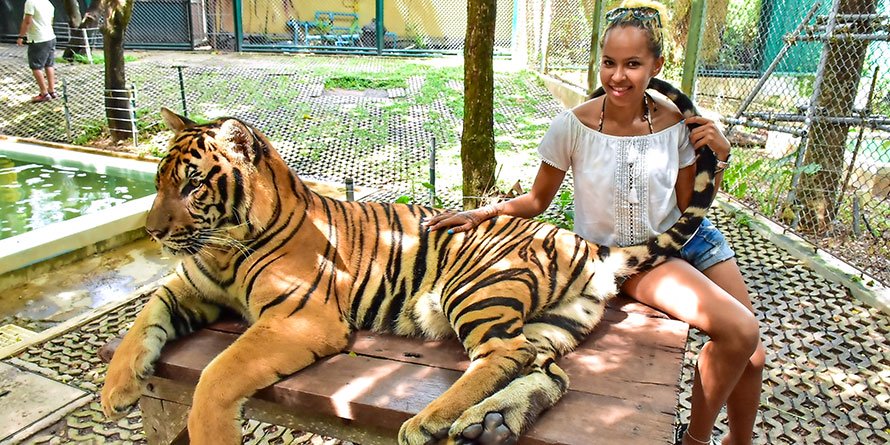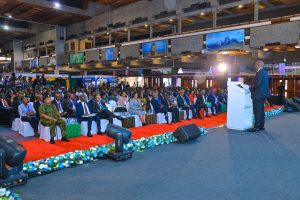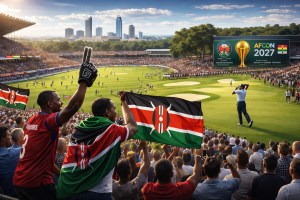Whether it is to revel in the Caribbean’s charming weather, to hike in Macau, shopping expeditions in France or to party in Ibiza, for young Kenyans with money, the world is their oyster.
With few or no family responsibilities, their money is largely spent on adventure. They travel the world solo or in groups, and some have even started travel groups, with target destinations every year.
So, what is it like to travel as a millennial? How do they balance their careers with their propensity for travel?
Mina Reeve, 28
Mina has been to the UK, Netherlands, Thailand, France, Spain and to the United Arab Emirates. She has also been to Zimbabwe and Zambia. Thailand, where she stayed for two weeks, stood out for her, especially the food.
“Street food is cheap. Getting around with canoes and scooters was fun. The architecture is delightful,” she says.
Mina plans her travels in advance, sometimes six or seven months before.
“Flight tickets are affordable if you book in advance. This allows me to pay for the ticket in instalments. I also pick connecting flights because they are cheaper,” she says.
For accommodation, she relies on various websites including Booking.com and Airbnb.
“I normally pack one bag because I’ll return with more luggage after shopping,” says Mina, who’s also a member of a local millennials tour group.
“Water sports, skydiving, sightseeing and shopping make up my schedule. I’m very adventurous, so anything sporty or adrenalin-inducing excites me,” she adds.
Travelling doesn’t get in the way of her young career. As a teacher (she teaches sports and health science at Braeburn School), I capitalise on school holidays. I must do one international tour every year,” she says. “I like to stay in nice places. My type of activities cost a lot of money. Dining, partying and shopping are particularly very costly,” she says.
On a tour, Mina normally spends between Sh150,000 and Sh200,000.
‘‘It sounds like a lot of money, but these are months-long savings,” she says.
Mina travels to learn about different cultures, to meet new people and for new ideas. “I am an opportunist, so I like to engage people and to grow my networks. Travelling is also liberating,” she says. Any trouble while travelling so far? None that she can think of, she says.
“I’ve been called Latina, Arab, Indian, African, Caucasian and even Asian.I don’t take racist comments seriously.”
When she is not flying half the world for adventure, Mina likes to lose herself in Lamu, Malindi, Diani, Mombasa, Samburu, Amboseli or Ngare Ndare.
Dismissing the notion that travelling is an expensive affair, she argues that it boils down to early planning.
“When the trip costs a lot of money, compensate by making the most of your stay in that country,” she says.
Emmanuel Kinara, 29
Emmanuel has been to hiking expeditions in Oman and Georgia and has been to the last three editions of the World Cup in South Africa, Brazil and Russia.
The list of countries he has visited is nearly inexhaustible. He has visited Qatar, UAE, Iran and Lebanon. He has also been to Ukraine, Poland, Belarus, Romania, Italy, France, Netherlands, Switzerland, Germany and the UK.
Visits to Brazil to watch the World Cup in 2014 and to Napoli in Italy that same year to attend a friend’s wedding are the most memorable tours for Emmanuel who work in Australia.
“I liked the relaxed atmosphere and weather. They have large open farmlands and vineyards. The food is also mind-blowing,” he says, adding that Brazil is pretty affordable.
Travelling to a country during a major sporting event is as convenient as it’s cheap. “Blending in is also easier because there are usually many travellers,’’ he says, adding that travelling to Norway to watch the Northern Lights is his ultimate travel goal.
So, how does he plan for his travels?
“I make sure I have my travel documents, credit cards and US dollars just in case some places don’t accept credit cards. Phone chargers and international SIM card with a portable Internet device are important. I’ll also pack a cap and a pair of sketchers that I can wear with anything,” he says.
For ease of check-in and checkout procedures and at airports, Emmanuel carries only one backpack.
Emmanuel travels in groups of mostly two to three people because some of the trips are work-related. Each trip lasts between three days and slightly over a week.
Now with a young family, Emmanuel says his travel frequency has reduced, with a cumulative two months of travel in a year. He has four trips lined up in 2020.
To Emmanuel, travelling affordably means taking advantage of travel miles and staff privileges for air tickets.
“I mostly book into backpacker hostels or share spaces through Airbnb or CouchSurfing. The advantage of these is that you get to enjoy local hospitality, food and the culture,” he says.
Instead of taking an insurance cover every time he has to travel, he gets an annual cover, which is cheaper.
“A yearly cover costs about Sh28,000 while an individual one goes for roughly Sh7,000. Air tickets sell for between Sh30,000 and Sh130,000. With the rebates though, I mostly pay an average of Sh15,000,” he says.
“I use TripAdvisor to filter out activities. This way, I’m able to join free guided tour groups,” he says, adding that he either walks or uses public means to move around.
On average, Emmanuel spends between Sh5,000) and Sh7,500) every day to cover food, bus fare and accommodation. “Europe is even cheaper because there are many options for backpackers,” he says.
Is travelling cheap? No, he disagrees, but argues that routine activities are even more expensive.
“People host parties nearly every weekend and spend a lot of money on drinks. These amounts would comfortably fit within a dream trip if saved for a few months in a year,” he says.
Lisette Gachanja, 29
Off the top of her head, Lisette says she has been to 15 countries. These include Mexico, Hong Kong, Macau, Malaysia, Singapore, Ghana, South Korea, US and Australia.
By averaging five countries every year since 2017, she believes she’s inching closer to becoming a global citizen.
Before she embarks on a trip, Lisette researches about key attractions and fun activities before drafting her itinerary around them.
“I check for visa processes, flights and in-country travel. Checking weather patterns and currency rates is also critical for planning. Often I download apps to help with language, navigation, currency conversion and popular attractions,” she explains.
She considers herself a big planner, by drawing several mini-budgets to avoid incurring miscellaneous expenses.
“I have invested in a lot of gear to cushion me from having to buy new clothes, shoes and travel bags for every trip,” says Lisette, who travels alone and, whenever possible, with either her partner or family.
Whenever she’s out on a trip that will usually last between a week and one month, Lisette prefers to go off the beaten path by keeping off “predominantly tourist adventures” and instead finding culturally immersive activities, discovering hike paths and camping.
“I love indigenous things. Trying out local cuisine is a definite must. My priority is always to maximise on attractions that aren’t available back at home.”
Has globetrotting affected her career? It’s only fortified it, she says.
“I’m an adventure consultant, so merging work and play is, thankfully, my biggest privilege.”
To answer the question on how she raises money for her tours, Lisette employs a philosophy:
“Money spent on something always comes back to you. You, however, can’t reverse the clock. Time and memories made can’t be replaced.”
‘‘I‘m not a spendthrift, but as soon as I’ve ticked an item off my travel list, I start to plan my next adventure, within my budget and with a goal,’’ she says.
Destinations in her travel bucket list are Latin America and New Zealand. The lure? Indigenous tribes and breathtaking landscapes.
“I can’t wait to kayak in the Amazon River and to go caving in the remotest parts. Swimming with bioluminescent plankton is definitely something to look forward to,” she says.
Other than the thrill of visiting a foreign country, Lisette’s experiences have been largely uneventful.
Equally big on local tourism, she has arced the country from Lodwar to Namanga and from Malaba to Lamu.
“Every weekend finds me out and about. Whenever I can, I travel on weekdays too.”
For young women hoping to tour the world, Lisette proposes audacity, but within a rational plan.
“You can have a great time doing solo or partner travels,” she advises. “Research on affordable travel deals.Arrange and oversee your own travel plans because it’s cheaper this way than having someone do it for you. Have adventure!”




